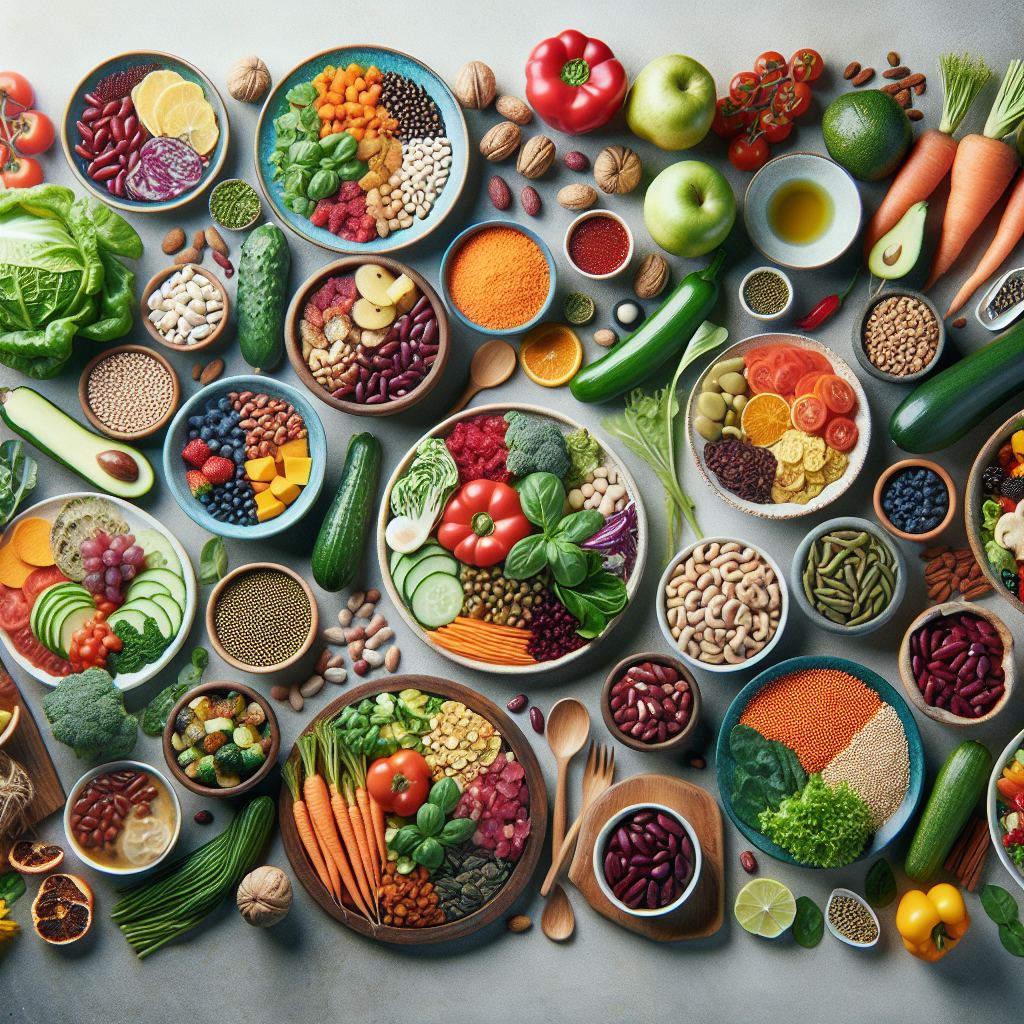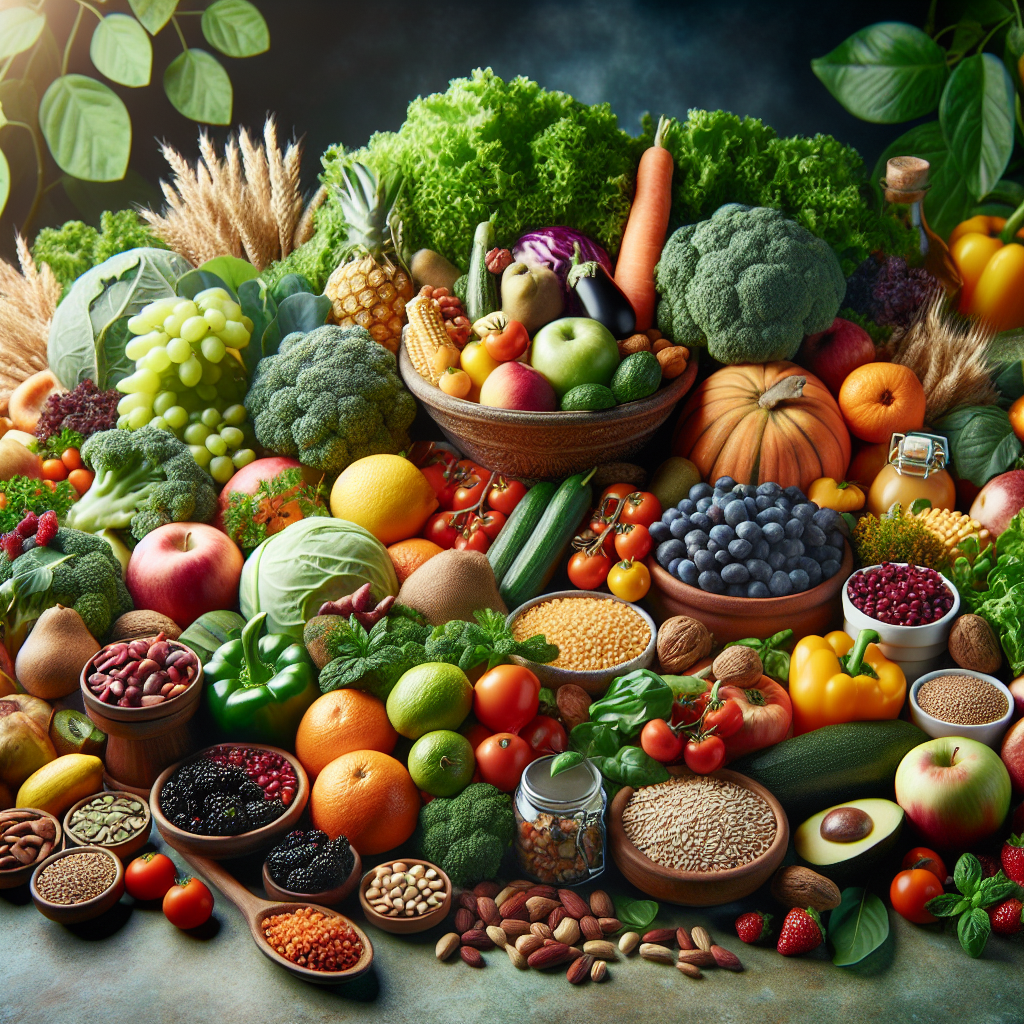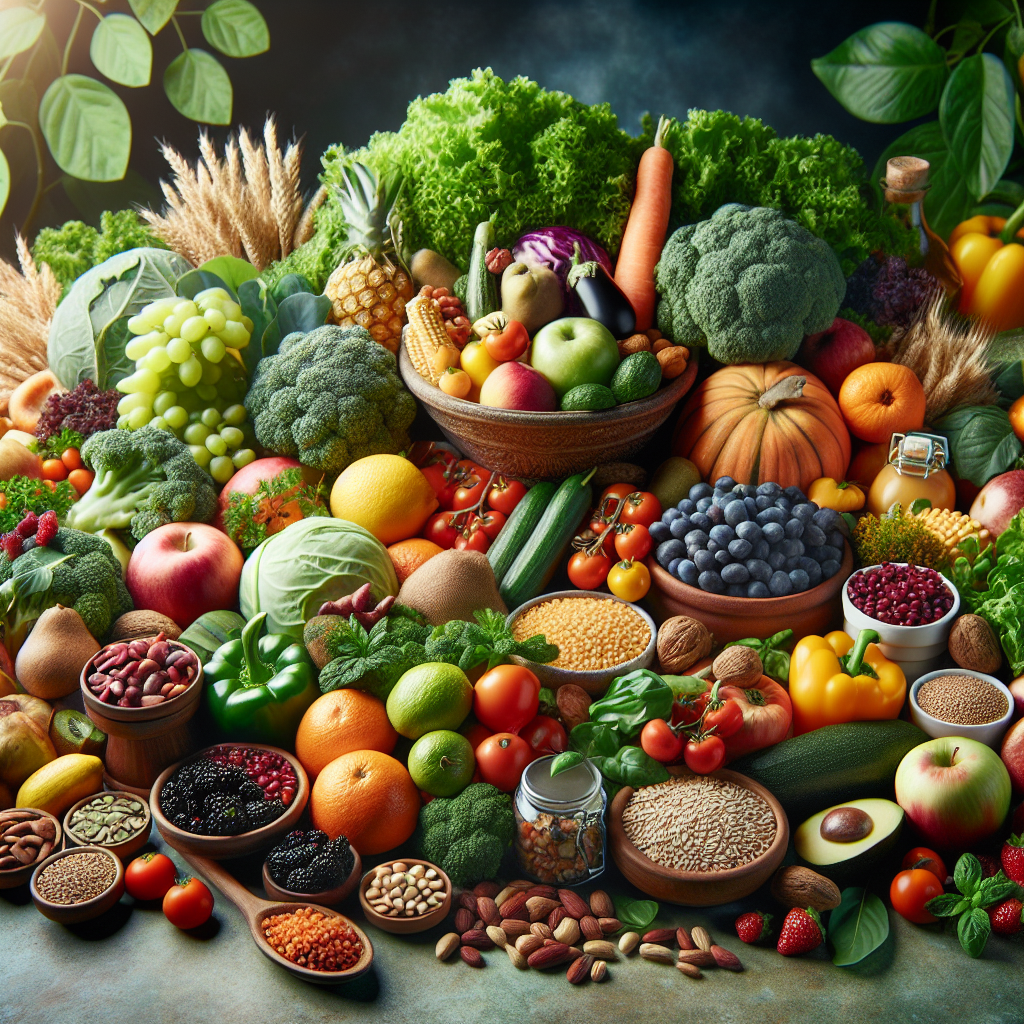You’ve made the decision to embrace a vegetarian diet and now you’re wondering how to ensure that you’re getting all the nutrients your body needs. Don’t worry, we’ve got you covered! In this article, we’ll explore some simple yet effective strategies to ensure you’re getting adequate nutrition on a vegetarian diet. From balancing protein sources to incorporating a variety of vegetables and whole grains, you’ll discover practical tips to help you thrive on your vegetarian journey. So, let’s dive in and discover how to nourish your body while enjoying a delicious and satisfying vegetarian diet.
The Basics of a Vegetarian Diet
A vegetarian diet is one that excludes meat, fish, and poultry. Instead, it focuses on plant-based foods such as fruits, vegetables, legumes, whole grains, nuts, and seeds. There are various types of vegetarian diets, each with its own restrictions and allowances. It’s important to understand these different types to ensure that you’re meeting your nutritional needs.
Different Types of Vegetarian Diets
- Lacto-ovo vegetarian: This is the most common type of vegetarian diet, which includes dairy products and eggs along with plant-based foods.
- Lacto-vegetarian: This diet excludes eggs but includes dairy products.
- Ovo-vegetarian: This diet excludes dairy products but includes eggs.
- Vegan: A vegan diet excludes all animal products, including dairy, eggs, and honey. It focuses solely on plant-based foods.
Now that you understand the basics of different vegetarian diets, let’s delve into understanding the nutritional needs of a vegetarian diet.
Understanding Nutritional Needs in a Vegetarian Diet
A well-planned vegetarian diet can provide all the necessary nutrients for a healthy lifestyle. However, there are key nutrients that you need to focus on to ensure you’re meeting your dietary needs.
Key Nutrients to Focus on
- Protein: Protein is an essential macronutrient that plays a crucial role in building and repairing tissues, as well as maintaining a healthy immune system. It’s important to consume an adequate amount of protein to meet your body’s needs.
- Iron and Zinc: Iron is necessary for the production of red blood cells and carrying oxygen throughout the body, while zinc supports a healthy immune system and aids in wound healing.
- Calcium: Calcium is essential for maintaining strong bones and teeth, as well as for proper muscle and nerve function.
- Omega-3 Fatty Acids: Omega-3 fatty acids are important for heart health and brain function.
- Vitamin B12: Vitamin B12 is necessary for proper nerve function and the production of red blood cells.
- Vitamin D: Vitamin D is crucial for calcium absorption and maintaining healthy bones.
Now let’s explore each of these nutrients in more detail and how to meet your requirements on a vegetarian diet.
Meeting Protein Requirements
Protein is often a concern for those following a vegetarian diet, as meat and fish are traditional sources of protein. However, there are many plant-based sources of protein that can easily meet your requirements.
Vegetarian Sources of Protein
Include a variety of protein-rich plant foods such as beans, lentils, chickpeas, tofu, tempeh, seitan, quinoa, and edamame. Nuts and seeds, including almonds, walnuts, chia seeds, and hemp seeds, are also excellent sources of protein. Incorporating these foods into your meals and snacks will help ensure that you’re getting sufficient protein.
Combining Plant Proteins for Complete Protein
While each plant-based protein source has its own amino acid profile, combining different sources can help ensure you’re getting all the essential amino acids your body needs. Pairing grains with legumes or nuts/seeds with legumes can create a complete protein. For example, enjoy a lentil soup with whole-grain bread or add chickpeas to a quinoa salad.
Protein Supplements for Vegetarians
If you’re having difficulty meeting your protein needs through whole foods alone, protein supplements can be a convenient option. Look for plant-based protein powders derived from sources like peas, brown rice, or hemp. These can be blended into smoothies, added to recipes, or enjoyed as shakes to increase your protein intake.

Getting Sufficient Iron and Zinc
Iron and zinc are important minerals that can be obtained from plant-based sources.
Plant-based Sources of Iron
Plant-based sources of iron include legumes such as lentils, chickpeas, and black beans, as well as tofu, tempeh, quinoa, fortified cereals, and dark leafy greens like spinach and kale. These foods can easily be incorporated into your meals to help meet your iron needs.
Enhancing Iron Absorption through Vitamin C
Consuming foods rich in vitamin C alongside iron-rich plant foods can enhance iron absorption. Add citrus fruits like oranges or grapefruits, tomatoes, bell peppers, or broccoli to your meals to maximize iron absorption.
Plant-based Sources of Zinc
Plant-based sources of zinc include legumes, nuts, seeds, whole grains, and tofu. Incorporate these foods into your diet to ensure you’re getting sufficient zinc.
Increasing Zinc Absorption
Similar to enhancing iron absorption, consuming foods high in vitamin C can also increase zinc absorption. Additionally, soaking or sprouting legumes, nuts, and seeds can help increase zinc bioavailability.
Ensuring Adequate Calcium Intake
Calcium is crucial for maintaining strong bones and teeth. While dairy products are the most common source of calcium, there are plenty of dairy-free alternatives and plant-based foods that can provide this essential nutrient.
Dairy-Free Calcium Sources
Opt for plant-based milk alternatives fortified with calcium, such as almond, soy, or oat milk. Additionally, incorporate calcium-rich foods like tofu, tempeh, almonds, sesame seeds, kale, collard greens, and broccoli into your meals.
Calcium in Fortified Plant-Based Products
Fortified plant-based products, including cereals, bread, and plant-based yogurts, can also be good sources of calcium. Read the labels to ensure they are fortified with calcium.
Combining Plant Foods for Calcium Absorption
Pairing calcium-rich foods with sources of vitamin D, such as mushrooms exposed to sunlight or fortified plant-based milks, can enhance calcium absorption. Including vitamin C-rich foods alongside calcium sources can also help increase absorption.

Essential Omega-3 Fatty Acids
Omega-3 fatty acids are essential for heart health and brain function. While fatty fish is a common source of omega-3s, there are plenty of plant-based sources available.
Plant-Based Sources of Omega-3s
Include flaxseeds, chia seeds, hemp seeds, walnuts, and algae-based supplements in your diet. These foods provide a type of omega-3 called alpha-linolenic acid (ALA), which the body can convert into the active forms of omega-3s, eicosapentaenoic acid (EPA), and docosahexaenoic acid (DHA).
Conversion of ALA to EPA and DHA
Although the conversion of ALA to EPA and DHA is not as efficient as getting them directly from fish sources, regularly consuming plant-based sources of omega-3s can still contribute to overall intake.
Supplementing with Algae-Based Omega-3s
For those who prefer a direct source of EPA and DHA, algae-based omega-3 supplements are available. These supplements are derived from algae, the original source of omega-3s for fish.
Meeting Vitamin B12 Needs
Vitamin B12 is an essential nutrient for proper nerve function and the production of red blood cells. It is primarily found in animal products, but there are still ways vegetarians can ensure adequate intake.
Understanding Vitamin B12 Deficiency
Vitamin B12 deficiency is common among vegetarians, as natural food sources are limited. Deficiency can lead to fatigue, weakness, and neurological problems. It’s important to address this through dietary choices or supplementation.
Plant-Based Sources of Vitamin B12
Some sources of vitamin B12 for vegetarians include fortified breakfast cereals, plant-based milk alternatives, and nutritional yeast. However, it is crucial to read labels carefully to ensure adequate amounts of vitamin B12 are provided.
Vitamin B12 Fortified Foods and Supplements
To ensure sufficient vitamin B12 intake, it may be necessary to incorporate vitamin B12 fortified foods into your diet, such as fortified plant-based milks, cereals, or meat substitutes. If needed, vitamin B12 supplements are also available.
Optimizing Iron and Vitamin C Pairing
Pairing iron-rich plant foods with vitamin C can enhance iron absorption, ensuring you’re maximizing the benefits of these nutrients.
Iron-Rich Plant Foods and Vitamin C Pairings
Pair iron-rich foods like lentils, chickpeas, and tofu with vitamin C-rich counterparts like bell peppers, citrus fruits, strawberries, or tomatoes. For example, enjoy a lentil and tomato salad or a tofu stir-fry with bell peppers.
Delicious Recipes Combining Iron and Vitamin C
Experiment with recipes that combine iron and vitamin C-rich ingredients, such as a spinach and strawberry salad, lentil soup with tomatoes, or a tofu and bell pepper stir-fry. These combinations not only provide a delicious meal but also optimize your nutrient absorption.
Balancing Carbohydrates and Fats
A balanced vegetarian diet includes a well-rounded distribution of macronutrients such as carbohydrates and fats.
Healthy Vegetarian Sources of Carbohydrates
Incorporate whole grains like quinoa, brown rice, oats, and whole wheat bread into your meals. Legumes, such as lentils, chickpeas, and black beans, are also excellent sources of carbohydrates. These complex carbohydrates provide sustained energy and important nutrients.
Choosing Good Fats for a Vegetarian Diet
Incorporate healthy fats into your vegetarian diet through sources like avocados, nuts, seeds, and plant-based oils like olive oil and coconut oil. These fats are rich in omega-3 fatty acids and can provide important nutrients while adding flavor to your meals.
Maintaining Optimal Vitamin D Levels
Vitamin D is crucial for calcium absorption and maintaining healthy bones. While sunlight is the primary source of vitamin D, there are other ways for vegetarians to ensure sufficient intake.
Natural Sources of Vitamin D for Vegetarians
Spend time outdoors in the sunlight to allow your body to naturally produce vitamin D. Exposing your skin to the sun for around 15 minutes a day can help maintain adequate vitamin D levels. However, this may not be possible for everyone, especially in certain geographical locations or during colder months.
Supplementing with Vitamin D
If you’re unable to get enough vitamin D from sunlight or natural food sources, consider taking a vitamin D supplement. Choose a vegan-friendly supplement derived from lichen or other plant-based sources.
Consulting a Registered Dietitian
While the information provided in this article is a useful guide, it’s always beneficial to seek professional guidance when embarking on a vegetarian diet.
Benefits of Professional Guidance
A registered dietitian can help tailor a vegetarian meal plan based on your individual needs and preferences. They can ensure you’re meeting all your nutritional requirements and provide personalized advice for optimal health.
Personalized Nutritional Planning for Vegetarians
By working with a registered dietitian, you’ll receive personalized guidance on meeting your nutritional needs, addressing any deficiencies, and exploring creative ways to incorporate a variety of plant-based foods into your diet. They can also help dispel any myths or misconceptions surrounding vegetarianism and provide support and accountability throughout your dietary journey.
In conclusion, a well-planned vegetarian diet can provide all the necessary nutrients for a healthy lifestyle. By understanding the different types of vegetarian diets and the key nutrients to focus on, you can ensure you’re meeting your nutritional needs. Incorporate a variety of plant-based protein sources, incorporate iron and zinc-rich foods, ensure adequate calcium intake, consider omega-3 fatty acids and vitamin B12 sources, balance carbohydrates and fats, maintain optimal vitamin D levels, and seek professional guidance for personalized nutritional planning. Remember, a vegetarian diet can be both nutritious and delicious, and with proper knowledge and planning, you can thrive on this plant-based lifestyle.

